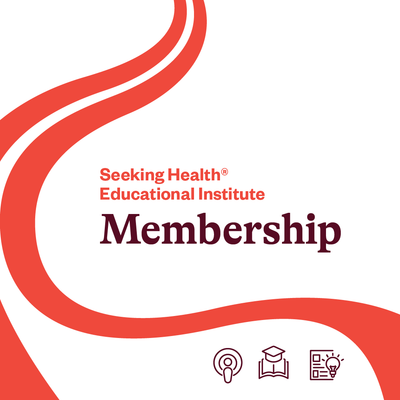TL;DR The MTHFR gene plays a crucial role in processing folate, a nutrient essential for pregnancy. Mutations in this gene can impact both maternal and paternal fertility, increasing risks such as pregnancy loss, low sperm quality, and developmental challenges in babies, especially if both parents pass on mutations. Before conceiving, parents should consider genetic testing, adopt a folate-rich diet, and use active folate supplements if needed. Folate-containing prenatals, like those from Seeking Health, can support fertility and your baby’s health, while guidance from a healthcare professional ensures personalized care and better pregnancy outcomes.†
What Is the MTHFR Gene, and How Does It Impact Pregnancy?

The MTHFR gene is essential for how your body uses folate, a B vitamin crucial for making new cells. This gene helps make an enzyme that turns folate into a form your body can use.
There are two common changes, or polymorphisms, in the MTHFR gene that scientists have studied a lot: C677T and A1298C. These changes can affect how well the enzyme works, impacting pregnancy.1,2
When the MTHFR gene doesn't work as well as it should, it can lead to higher levels of a substance called homocysteine in the blood. This might increase the risk of some pregnancy problems.
How Do Maternal MTHFR Mutations Affect Fertility and Pregnancy Outcomes?

Women with specific MTHFR gene mutations might have a higher chance of pregnancy complications like recurrent pregnancy loss, unstable blood sugar levels, and erratic blood pressure during pregnancy.3 However, taking folate supplements supports women with MTHFR gene mutations.4†
It's important to remember that having these gene changes doesn't mean a woman will definitely have pregnancy problems. Still, a healthcare professional might consider it when caring for pregnant women.
How Do Paternal MTHFR Mutations Affect Fertility and Pregnancy Outcomes?

So much focus is placed on the mom. Still, the dad's MTHFR mutations can have significant effects on fertility and pregnancy outcomes.
Men with specific MTHFR gene changes, especially the C677T mutation, may have lower sperm quality. This includes problems like lower sperm count, less sperm movement, and more abnormally shaped sperm. When this gene doesn't work correctly, it can lead to DNA damage in sperm cells.5,6
These paternal MTHFR mutations may also increase the risk of pregnancy problems. Some research has found that when fathers have the MTHFR C677T mutation, there's a higher chance of recurrent pregnancy loss. This means the couple might have multiple miscarriages. The mutation in fathers can also affect a baby's development and cause neurological problems.7,8 However, the good news is that taking folate supplements can help support men’s health when MTHFR mutations are present.†
Can MTHFR Mutations From Both Parents Increase Risks for the Baby?

When both parents carry a heterozygous A1298C mutation, there is a 25% chance their baby may inherit two copies of the A1298C mutation, resulting in a homozygous A1298C condition.

Here's another scenario to consider. Suppose the mother carries a heterozygous A1298C mutation, and the father carries a heterozygous C677T mutation. In that case, there is again a 25% likelihood the baby could inherit both mutations. This is called a compound heterozygous mutation, which significantly reduces the function of the MTHFR gene. The MTHFR gene operates at only 50% capacity for individuals with this combination.
It's important to know that combined mutations, such as homozygous or compound heterozygous MTHFR mutations, can negatively affect the body's ability to process folate effectively.9 Research has shown that these genetic combinations might decrease fetal viability, particularly in cases of folate deficiency. Adequate folate levels play a crucial role. They can help support some of the challenges associated with these genetic traits.†
Understanding and addressing folate sufficiency is essential for expectant parents or those trying to conceive. Equipping yourself with this knowledge and focusing on healthy nutrition can make a big difference in supporting the best pregnancy outcomes possible.†
What Mutations Should Parents Be Tested For?

If you have experienced recurrent pregnancy loss (RPL) or are planning to conceive, consult your health when preparing for pregnancy, including genetic testing for you and your partner. Key genes to test include:
- FVL – FVL2
- ApoE2
- PAI-1
- ACE
- MTHFR
MTHFR testing is particularly beneficial as it can also identify variations in related genes like COMT, GST, GPX, MTHFD1, DHFR, and others. A StratGene report is a great place to start because it details your genetic profile in a comprehensive 100+ page report. For mothers, additional tests for MMA, S-adenosylhomocysteine, and homocysteine levels are recommended to assess metabolic health.
These tests, alongside broader medical evaluations, can help promote a healthy pregnancy journey. Remember, there’s always reason to hope, even with RPL.
What Steps Can Parents With MTHFR Mutations Take To Support a Healthy Pregnancy?

For parents who have both been tested and found to carry MTHFR mutations, taking steps to support a healthy pregnancy is crucial. The first important step is consulting with a healthcare professional who understands MTHFR mutations and their potential effects on pregnancy. They can provide personalized advice based on the specific types of MTHFR mutations present.
Supplementing with methylfolate or other active forms of folate is essential, as these can help support health for those with MTHFR mutations. Maintaining a balanced diet full of natural folate sources like leafy greens, citrus fruits, and beans can also provide additional support.†
Here are five steps parents with MTHFR mutations can take:
- Consult a healthcare professional specializing in MTHFR-related issues for tailored advice.
- Take methylfolate or other active folate supplements as recommended by your healthcare professional.†
- Determine what to and what not to eat with an MTHFR mutation and nourish healthy fertility with a diet full of natural folate sources and other essential nutrients. There are also several foods to eat that provide natural prenatal vitamins and supplements to take in addition to a healthy diet.
- Consider lifestyle changes, such as supporting feelings of calm and avoiding smoking or excessive alcohol consumption.
- Monitor pregnancy closely with regular check-ups to address any concerns early.
- Discuss the potential need for additional supplements, such as vitamin B12, with your healthcare professional.†
Note that heterozygous MTHFR mutations are not associated with a risk when homocysteine levels are fine. Heterozygous A1298C (or C677T) is a mild and common mutation seen in the population. No treatment is necessary.
Seeking Health Prenatal and MTHFR Supplements
Give your baby the best start possible with the right nutrients, especially if you or your partner have an MTHFR mutation. Seeking Health™ has several options both mother and father can choose from to support healthy conception, pregnancy, and delivery. Our supplements take the guesswork out of making the right choices and include safe and science-backed formulas you can always trust to help you meet your healthcare goals.†

Optimal Prenatal: Formulated with 38 researched ingredients in the right amounts to support healthy fertility, pregnancy, and breastfeeding. It also supports mom's comfort due to occasional nausea or morning sickness.†

Prenatal Essentials: Contains bioavailable B12 and folate to support healthy methylation and DNA expression and promote healthy development of baby’s brain, spinal cord, and immune system.†

Optimal Man: An all-in-one-men’s health supplement. It’s a complete multivitamin/multimineral, along with supportive herbs, and loaded with antioxidants. Formulated to support men’s health, male fertility, and healthy testosterone levels.†

Methyl B12 with L-Methylfolate: This delicious, well-absorbed lozenge provides a potent dose of bioavailable folate and vitamin B12. It supports healthy methylation, homocysteine regulation, and energy production. It provides methylfolate and active B12, which can bypass the MTHFR gene to support methylation pathways for those with genetic mutations.†

Homocysteine Nutrients: Provides the 5 nutrients your body requires for optimal methylation. This unique formula supports the body’s normal homocysteine breakdown for heart health support.†
The Bottom Line

The MTHFR gene is essential in folate processing and vital for fertility and healthy pregnancy. Mutations in this gene, whether from the mother, father, or both, can impact fertility and increase risks such as recurrent pregnancy loss, lower sperm quality, and developmental issues in babies. While these mutations may pose challenges, maintaining proper folate levels through supplements from Seeking Health, a nutrient-rich diet, and guidance from a knowledgeable healthcare professional can make a significant difference. Taking proactive steps before conception helps ensure the best possible outcomes for you and your baby.†

References:
- https://pubmed.ncbi.nlm.nih.gov/36647865/
- https://pubmed.ncbi.nlm.nih.gov/27068821/
- https://pubmed.ncbi.nlm.nih.gov/36647865/
- https://pubmed.ncbi.nlm.nih.gov/37622180/
- https://pubmed.ncbi.nlm.nih.gov/27068821/
- https://pubmed.ncbi.nlm.nih.gov/32038964/
- https://pubmed.ncbi.nlm.nih.gov/31209737/
- https://pubmed.ncbi.nlm.nih.gov/30633186/
- https://pubmed.ncbi.nlm.nih.gov/10958762/
† These statements have not been evaluated by the Food and Drug Administration (FDA). This product is not intended to diagnose, treat, cure, or prevent any disease.












